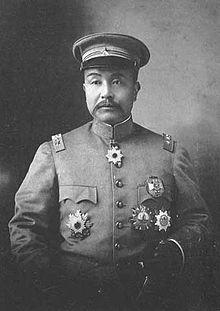Duan Zhigui | |
|---|---|
 Duan Zhigui | |
| Born | 段芝贵 1869 Hefei, Anhui |
| Died | 1925 Tianjin |
| Allegiance | |
| Rank | General |
| Awards | Order of the Rising Sun Order of Wen-Hu Order of the Precious Brilliant Golden Grain Order of Rank and Merit |
| Other work | Minister of War |
Duan Zhigui (simplified Chinese: 段芝贵; traditional Chinese: 段芝貴; pinyin: Duàn Zhīguì; IPA: [tu̯àn ʈ͡ʂīku̯èi̯] 1869 – March 1925) was a Chinese general. Born in Hefei, Anhui, he attained the post of Heilongjiang governor in the late Qing dynasty and between 1912-13 was governor of Chahar and the military governor of Hubei between 1914–15, as well as military and civil governor of Fengtian in 1915-16.
A staunch supporter of Yuan Shikai, he was nicknamed the "Adopted Prince", and when Duan Qirui, a fellow Hefei native, took the Beijing government in 1917, Duan was made a Minister of War;[1] however, with Duan Qirui's defeat by 1920, Duan Zhigui fled to the Japanese embassy. He was remitted in 1922 and lived in Tianjin until his death there in 1925.
References
- ^ "Tuan Chi-kwei (Duan Zhigui) 段芝貴 | The China Story". www.thechinastory.org. Retrieved 2018-05-23.
External links
- Tuan Chi-kwei (Duan Zhigui) 段芝貴 from Biographies of Prominent Chinese c.1925.
| Preceded by Wang Shizhen | Minister of War of the Republic of China 1917–1919 | Succeeded by Jin Yunpeng |